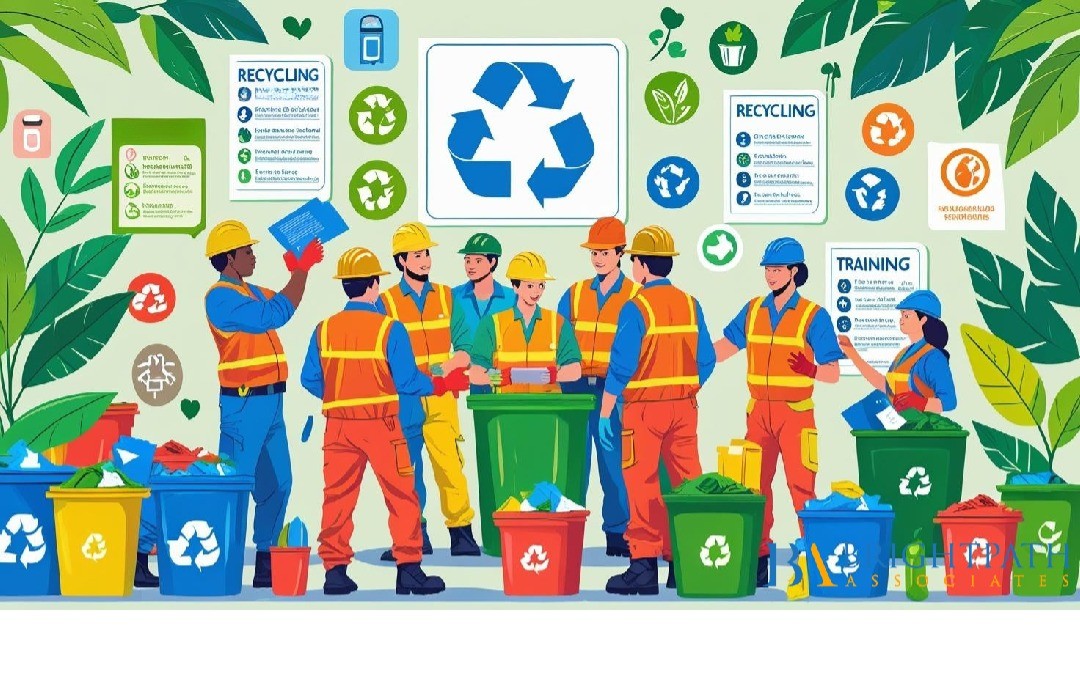In today’s rapidly evolving environmental landscape, the emphasis on building a Green Workforce has never been more paramount. As organizations strive for sustainability, the demand for comprehensive and effective sustainable waste management training has surged. This connection underscores a growing need to equip employees with the skills required to innovate and implement environmentally friendly practices across industries. The urgency of this training is further propelled by increasing public awareness of climate change, pollution, and the need for responsible consumption. With the integration of sustainability into corporate strategies, it is clear that a well-informed workforce is the backbone of any successful environmental initiative.
The Need for Sustainable Waste Management
#EnvironmentalSustainability is at the forefront of corporate agendas, driven by an urgent need to address the adverse impacts of traditional waste disposal methods. Waste management solutions have therefore become instrumental in achieving sustainability goals. Environmental services and consulting firms play a pivotal role in facilitating these waste management strategies. They guide organizations in implementing clean technology, controlling air pollution, and ensuring effective water treatment practices. The horrible ramifications of neglecting proper waste management are evident in the increasing issues related to landfill overflow, soil contamination, and the release of harmful substances into waterways. These elements are intertwined with the broader objective of creating a sustainable future, wherein resources are utilized efficiently, waste is minimized, and ecosystems are protected.
Industry Trends in Green Workforce Development
The development of a green workforce is characterized by several emerging trends in the realm of environmental innovation. As industries adapt to new eco-friendly paradigms, training programs for sustainable waste management have evolved significantly from 2023 to 2025. The integration of green technology has transformed how companies approach workforce development, encouraging a shift towards innovative solutions that prioritize environmental responsibility. Advancements in areas such as recycling technologies, biodegradable materials, and circular economy models are leading to the constant evolution of waste management strategies. This movement towards sustainability has led to the emergence of new roles, such as Sustainability Managers and Waste Diversion Officers, and the reevaluation of existing ones, reflecting the dynamic landscape of environmental services and consulting. Organizations are recognizing the importance of ongoing employee education, so training programs are increasingly incorporating digital platforms and gamified learning experiences to engage a diverse workforce.
Challenges in Building a Green Workforce
Despite the positive strides made, developing a proficient green workforce is not without its challenges. #LeadershipTalentShortages present a significant barrier, compounded by shifts in role expectations as industries align with environmental compliance standards. Many organizations struggle to identify leaders who understand both the technical aspects of waste management and the strategic vision required for long-term sustainability planning. Overcoming these challenges necessitates the involvement of executive search recruitment to secure qualified professionals who can lead the charge in sustainable practices. Moreover, fostering a workforce that embraces environmental compliance is crucial, requiring targeted strategies that promote adherence to environmental regulations. This can include mentorship programs, continuous professional development opportunities, and establishing a culture where every employee feels responsible for sustainability initiatives.
The Role of Recruitment in Building a Green Workforce
Harnessing the expertise of firms like Brightpath Associates in Executive Search Recruitment is pivotal in addressing the gaps in leadership within the environmental sector. By bridging these gaps, companies can ensure the smooth implementation of sustainable waste management practices. It is essential for firms to not only focus on filling the immediate vacancies but to develop a long-term strategy for talent acquisition in the environmental space. This means prioritizing candidates with a proven track record in environmental stewardship and a commitment to continuous learning. Executive recruitment strategies not only provide a steady pipeline of qualified leaders but also enrich the industry with diverse insights and innovations. Successful recruitment in green technology and environmental services hinges on identifying individuals who are not just leaders but pioneers committed to environmental sustainability. Partnerships with educational institutions can also be beneficial to create a Skilled Workforce equipped with the necessary tools and knowledge to excel in the field.
The Future of Sustainable Waste Management Training
Looking ahead, the landscape of sustainable waste management training is poised to be reshaped by trends in environmental sustainability. Companies are expected to invest in continuous learning and innovation-driven recruitment practices to maintain a competitive edge. The rise of smart waste management solutions, which utilize the Internet of Things (IoT) and data analytics, means that employees will need training that adapts to these technological advancements, fostering a workforce that’s agile and forward-thinking. Embracing diversity and inclusion will be integral to building a resilient green workforce, as broader perspectives catalyze creative solutions to environmental challenges. Additionally, engaging with community stakeholders and fostering corporate social responsibility initiatives will empower employees to feel connected to their roles in sustainability. The integration of these elements suggests a promising future where environmental consulting and waste management solutions are seamlessly intertwined, creating a cohesive approach to tackling the pressing environmental issues we face globally.
Conclusion
In conclusion, the importance of #SustainableWasteManagement training cannot be overstated in today’s environmentally conscious society. As companies navigate the multifaceted challenges of environmental compliance and innovation, developing a green workforce is a strategic imperative that can no longer be sidelined. The role of executive recruitment, such as those provided by environmental consulting experts, remains critical in fostering leadership capable of driving environmental sustainability. The push for a green workforce will not only transform organizational practices but also enhance corporate reputation and stakeholder trust. Looking to the future, the intersection of clean technology, waste management, and a committed workforce will define the trajectory of the environmental services industry and its ability to thrive amidst evolving demands. By prioritizing training, recruitment, and innovative practices, businesses can profoundly impact the environment while simultaneously paving the way for sustainable economic growth.

